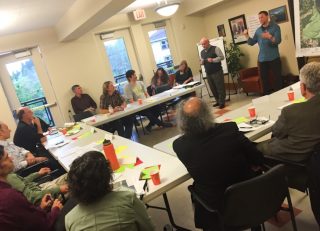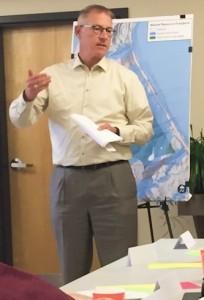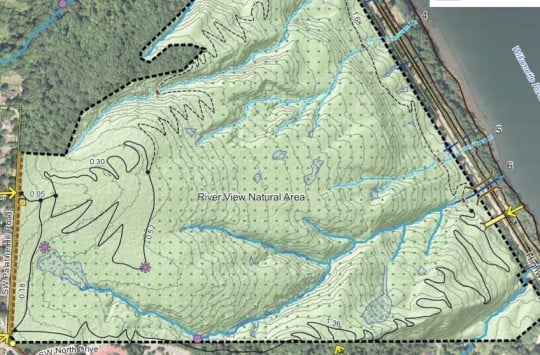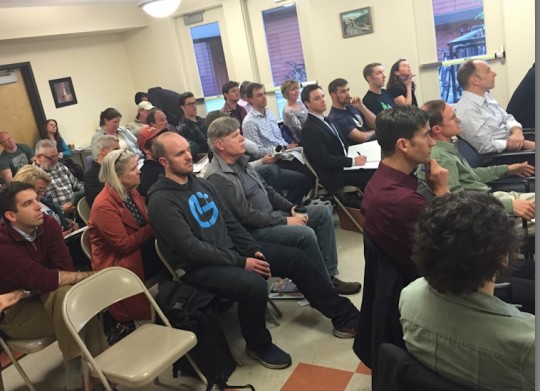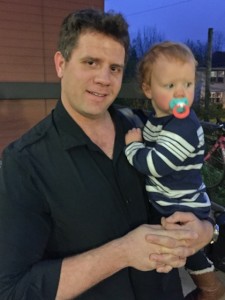On Wednesday of last week, the Portland Parks & Recreation Bureau hosted a Project Advisory Committee (PAC) meeting for the River View Natural Area. It was the first such meeting in 14 months for the group charged with developing a management plan for the 146-acre parcel.
Mountain bike advocates have been eager to re-engage with the process and learn more about why their activity was banned by Commissioners Amanda Fritz and Nick Fish last month. (Prior to the city’s purchase of River View, Portlanders had ridden bikes on its many trails for over two decades.) That decision came without warning and was made completely outside of the established public process.
The decision has made Portland a national embarrassment.
While he can’t keep Portland’s anti-mountain biking stances out of the headlines, at Wednesday’s meeting Parks Director Mike Abbaté did his best to make sure the topic of biking remained out of the public process around River View.
Here’s Abbaté attempt at doing that in his opening address to the committee and the assembled public:
“Tonight, we can’t address the change in policy direction that restricts mountain biking use on the site. That’s not the topic of the meeting tonight and we’re not going to talk about that… What we’re really here for today is moving forward the planning process that protects the natural resources of the site and compatible uses. As such, bicycling will not be considered — yay or nay — as part of this management plan.”
Several times in the course of the meeting, Abbaté and Parks planner Emily Roth were forced to repeat that they could not talk about the mountain biking decision.
“Why is cycling considered not compatible?” asked committee member and Northwest Trail Alliance representative Brian Baumann. “We have not made that decision,” Roth replied. “Then why is it restricted?” Baumann followed, “At this time, we’re just not allowed to talk about it at this moment.”
I tracked down Parks Director Abbaté when he left and asked him myself. “I can’t talk about it Jonathan, I just can’t talk about it,” he said.
This echoes what Parks announced in early April when they re-opened the public process. They also told their Technical Advisory Committee to carry on without biking in the mix.
The silence around cycling is likely due to the pending legal action against the city by the Northwest Trail Alliance.
Even before that legal filing, Abbaté, Roth, and their boss, Parks Commissioner Fritz, wanted all discussions of mountain biking in city parks to happen within the Off-Road Cycling Master Plan process. Yet despite talking like the plan is inevitable, it isn’t funded and it remains to be seen whether City Council will authorize its $350,000 price tag.
Advertisement
This sudden silence around cycling was a bit awkward on Wednesday because two members of Project Advisory Committee (PAC) were there specifically to represent the activity: Charlie Sponsel, a professional rider; and Baumann with the Northwest Trail Alliance. Sponsel recently led a large protest rally in River View and it’s Baumann’s group that has filed an intent to appeal the Commissioners’ bike ban decision with the State’s Land-Use Board of Appeals.
“I’m not sure about the wisdom of finalizing the trail system before we’ve finalized the decision of trail uses.”
— Jay Withgott, Audubon Society of Portland
After Abbaté’s opening remarks, Sponsel asked the obvious question: “If we’re not going to discuss mountain biking, why are Brian and I here and how are you hoping we can contribute?”
Abbaté replied by telling Sponsel his perspective should not be “narrowly defined to focus on bike issues” and that his input in the River View process could help inform the Off-Road Cycling Master Plan.
Sponsel was very active during the meeting. He dogged Parks staff with a constant stream of questions that forced them to address not just bicycling’s future at River View but a myriad of other trail and access issues. His questions, combined with Baumann’s clear voice of opposition, resulted in a meeting that ended up with some positives for bike advocates, not to mention a few more supporters.
For Parks, the meeting didn’t go as planned. Instead of moving forward and getting committee endorsements of their draft trail plan prior to an upcoming open house event on May 4th, they’ve been left with more work to do and some tough questions to ponder.
Once the committee got to work, Parks’ Natural Resources Planner Emily Roth (she was also the agency’s point person on the Forest Park singletrack process) introduced the latest “access concept” map. This map shows two phases of a hiking-only trail that runs just over four miles and stays mostly around the outside edge of the parcel.
This draft map raises concerns for bike advocates for several reasons: It was created (mostly) in secret by the Technical Advisory Committee without input from the PAC; it includes no trails built for bicycling; and it leaves a large interior section of the parcel devoid of public access.
On the other side of the debate, Jennifer Seamans, manager of the Southwest Watershed Resource Center, offered support for Parks’ current plan. “There are very few or no other areas like this in the city,” she said, “This is an unprecedented opportunity for a relatively in-tact watershed and I think Parks is right to recommend that we protect that interior habitat.”
The decision to endorse the draft access map is important, because of something Roth made clear at the outset meeting. “If, through the citywide mountain bike plan, River View is selected as an appropriate site,” she said, “the final recommended trail concept [approved by the PAC], will not change.”
Since whatever management plan and access map is approved by the PAC will be set in stone, much of the discussion on Wednesday centered around an effort by Baumann, Sponsel, and other supporters of cycling on the committee, to not preclude bike access or additional trails in the future.
In a discussion about the design of the trails in the draft plan (presented by Steve Roelof of ESA Vigil-Agrimis), Baumann from the NW Trail Alliance said any trail design that doesn’t have biking in mind might be a de facto prohibition (because some trails designed for hiking might not be suitable for bike use). “I’m concerned that if we’re not forward thinking about that, we’re putting this plan forward and eliminating the possibility of other uses in the future.”
Both Baumann and Sponsel made it clear that the current draft trail plan falls far short of what they’d like to see.
Here’s more from Bauman from an email he sent us after the meeting:
“The current plan calls for approximately four miles of trails. Even if these are to become multi-use, I feel this Plan falls miserably short of meetings the needs of cyclists… Mountain bikers have different trail needs than hikers, and if these trails are built for hikers (as they will be since cyclists are banned) they will not be quality trails for cyclists if/when they are allowed back into RVNA [River View Natural Area]. It will become Powell Butte West, which is not what cyclists want to experience. If the plan remains at 4 miles of shared use trails (assuming cyclists are added into the mix in the future), we may have overcrowding leading to user conflict.”
At one point, as Baumann and Sponsel both expressed grave concerns that the existing plan would make it almost impossible to go back and add more biking access later, Abbaté stepped in and tried to soften Roth’s stance that the PAC’s adopted plan would be final. He wanted them to think that even if the plan goes through, it could always be changed at a future date.
“In the world we live in, nothing is forever,” he said. “Plans and policies that get adopted by city council get amended and modified… And that’s part of a democratic process.”
This did nothing to quell the fears of Sponsel and Baumann. They felt like Parks was trying to set them up for failure. Here’s how Sponsel replied to Abbaté:
“If this is a ‘forever plan,’ I’m trying to figure out if trail expansion is possible under this existing document. Because to change this existing document you’d be asking mountain bikers to not pay attention to the ecological prescriptions in this document…that’s a completely un-winnable argument. There’s no scenario where mountain bikers win by telling people to ignore ecological prescriptions, so it’s a de-facto ban forever for trail expansion. Or is it?”
Sponsel then proposed that the PAC endorse a new trail — one not in the current draft plan — that would go down the middle of the parcel (and not cross any streams).
The discussion that followed exposed how tricky and messy this process has gotten.
Roth, the Parks planner, says since biking is not currently considered a “compatible recreational use,” it cannot be considered in developing this trail plan. And when this trail plan is adopted by the PAC, Roth says it would be set in stone. But, what if a potential Off-Road Cycling Plan finds that biking is compatible at River View? Would the City and advocates have to then go through an entirely new process to amend the management plan?
That’s a question that Roth and the Parks bureau don’t seem to have fully thought through.
Jay Withgott, the committee’s representative from the Audubon Society of Portland, supports Parks’ conservation stance, but even he raised concerns about pre-empting future bike access. “I’m not sure about the wisdom of finalizing the trail system before we’ve finalized the decision of trail uses.”
To that end, Baumann then remarked, “If we’re going to make an educated trail plan here, doesn’t it make sense to do it all at once instead of doing hiking now and trying to do bicycling later?”
Roth tried to clarify by saying that even if the PAC endorsed a new trail in the middle of the parcel, the committee would have to assume it’s a hiking trail because biking can’t technically be even considered at this time.
Because bicycling is a “a restricted use at this time,” Roth said, the only option for the PAC is to endorse the existing draft access map and possibly add language to the management plan that would leave the door open for new trails in the future. There wasn’t much support for simply adding what would be an empty, one-line promise to the plan.
Or, as Baumann put it to me after the meeting,
“I felt the language that was being considered was too weak and open for interpretation that could be used against our desired outcomes. It did not mention the word “cycling,” nor did it include a timeline or even a requirement for doing so. In other words, the language included nothing measurable thereby reducing accountability for Parks to our desired outcomes as a user group.”
When asked by Sponsel if there were other access plans that were considered or that didn’t make the cut, Roth said no.
“For this process we didn’t give options,” Roth said. “We looked at the criteria and asked: ‘What is the best plan that could meet that criteria?'” Sponsel replied by saying, “Well, if that’s the plan that fits the criteria, do we really have a choice? If that’s the best a team of trained trail designers can come up with than there really isn’t a choice here.”
This debate fostered skepticism about Parks’ plan and seemed to win Sponsel and Baumann support on the committee. Steve Manton, a park neighbor, said he doesn’t want to see the door closed on future bike access at the park. Another committee member and nearby resident Chris Sautter said he also wants another trail in the middle of the parcel. “I like the idea of more loops… whether I’m walking or biking or running. Having more choices is great.” Mauricio Villarreal, a member of the Portland Parks Board and the committee, also supported the consideration of bike access in the future.
Since this PAC is only an advisory body and not able to make decisions, nothing was finalized on Wednesday. Parks hasn’t scheduled the next PAC meeting and their version of the notes have not been published yet.
At the end of the meeting, the public was allowed to make comments. Several people stood up to support cycling. One of them was Aaron Malone. He had sat through the entire two-plus hour meeting with his 20-month old daughter in his arms. “This is my daughter Maddy,” he announced to everyone in the room, “If this area is off-limits to mountain biking, where is she going to ride?”
The next step in this process is a public open house on May 4th. Parks hopes to have a draft plan in front of City Council by the end of September. Read all our River View coverage here.

